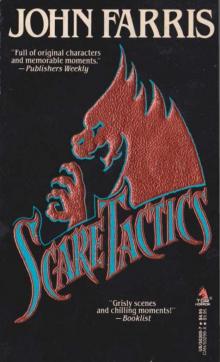- Home
- Farris, John
Dragonfly Page 4
Dragonfly Read online
Page 4
Whatever it was, he resolved to change it. Beginning first thing in the morning.
Chapter Four
She was at a table under the awning of Le Breton, well shielded from the early-afternoon sun, absorbed in a hardcover junk novel. She'd had lunch; now she was dawdling. She wore Ray-Ban sunglasses with apricot-colored lenses and her head was tilted down toward the open book, so her eyes weren't visible. But unless she, turned out to be cross-eyed, she was one of the loveliest women Joe had ever seen.
When he paused by the table, standing where he cast his shadow across her, she didn't look up. The midday breeze did attractive things to her dark hair, which she wore medium-short, a waif cut. She had on a blue and white boat-neck knit shirt with a Greek key motif, matching shorts, and sandals. Her toenails were immaculately painted; apparently she didn't care for the beach. Her skin was pale for the tropics, but not an unappetizing shade of white; it had a café-au-lait luster, as if she might be one-quarter Creole. Her features, however, were too finely wrought: slender bridge to her nose, a somewhat high, intelligent forehead, full underlip but not so full as to weigh heavily above a small rounded chin. There was a cigarillo burning in an ashtray to one side of the table. She turned a page of her novel with long, shapely fingers. Her one affectation seemed to be a streetfighter's, assortment of rings on both hands.
The novel was called Savannah's Flame, by Pamela Abelard. It looked like a bodice-ripper, butJoe seldom read any fiction. The author was also a beauty; judging from the color photo on the back of the jacket.
"Any good?" Joe said.
She looked up with a slight inquiring smile, then laid the novel carefully down and raised her sunglasses to the crown of her head. Her large eyes were a shade of violet in the intense light of day.
"Abelard's okay, as long as she sticks to simple declarative sentences. Otherwise it's the literary equivalent of riding a tricycle."
Joe ran a hand across a three-day growth of beard and grinned at her. She picked up her cigarillo and smoked, still looking up at him with a pleasant expression that didn't quite affirm an interest in his presence. She held the cigarillo like a dart thrower.
"I'm Joe," he said.
"So am I." She let that ride briefly, then added, "Josephine." She blinked a couple of times; her gaze was muted by the brightness of the sky behind him. Her smile turned a little dreamy. She lowered the sunglasses and went back to her novel.
"I'll see you tonight," Joe said.
"Oh?" she murmured. "Where?"
"There's only one place. If you don't go to the beach and you're as bored with Techno as I am. The best dinner in the Iles des Saintes, followed by a moonlight cruise."
"To?"
"Anywhere you like, as long as you like."
Josephine turned another page.
"You must be the one who owns that sloop with the tumble-home hull parked out there in the harbor."
Joe let out his breath in a low sound of admiration.
"Do you sail?"
"All the time, when I was a kid. Not so much lately. Too busy earning a living."
"Seven-thirty," Joe said. "Should I meet you here?"
She thought about it. "No, in front of the church."
"The church?"
"Shouldn't I thank God for answering my prayers?" Josephine said.
She could talk boats, all right, and she understood the expensive differences between high-end production models and one that had been built to live in at sea by a designer who knew exactly what he wanted.
While Maman Arcelin prepared dinner for two in the fore-and-aft galley, Joe walked Josephine over every foot of the Dragonfly, then sat with her in the midships salon, showing her the notebooks in which his concepts for the Dragonfly had evolved over several years.
She praised his precise, clear technical drawings, and the realization of his ideas in evidence around them: the molded companionway with angled steps for safer footing when the boat was heeled, the spillproof plastic-coated wire shelving that kept his books in place, the complex jigging of trim and curved, flowing lines ofjoineiy work, the array of electronics at the nay station, which were cleverly concealed when not in use.
When Joe left her for a few minutes to consult with Maman Arcelin about some ingredient for a sauce that should have been aboard but wasn't, the two of them conversing in a highly colloquial French, Josephine scanned his books. He had the usual sailors' bibles; dictionaries in French, English and Spanish; Vasari's Lives of the Artists,Emerson, Thoreau and Voltaire, among other philosophers. Books about the sea, of course, and about music; quite a lot of scholarly sociology and, surprisingly, best-seller psychology—getting in touch with the child inside of you, and that sort of thing. But what the hell, Josephine thought, she had a weakness for Pamela Abelard and Danielle Steel.
His taste in art was discriminating, although there was little space for display aboard the Dragonfly: she particularly admired a figurative painting by Diebenkorn, an early Precisionist study of a Lake George barn by Georgia O'Keeffe, and an Agostini bronze of a galloping horse. In a hand-carved mahogany case she discovered a two-hundred-year-old Atlantic Neptune atlas containing, in meticulously colored engravings, the first accurate sea charts of the Atlantic Ocean.
Depeche Mode was on the stereo. Her taste. Josephine had brought the CD along, and also the latest from the Juilliard and a recent recording of the Schubert C-Major String Quintet by a new group in Heidelberg she admired, just in case his own musical favorites were of a kind to give her a raging headache. Joe was amiable about programming the evening's music to accommodate her.
Josephine had revealed a few things about her own life, and was content to ask no questions of him. Joe was unassuming about his lifestyle. No touch of brag. That would have bored her. Physically he was damned impressive—the blue eyes that Abelard routinely described as "incandescent" (the author was partial to strapping blue-eyed rogue-heroes in her novels). His own eyes were somewhat secluded, but not secretive, beneath a ledge of brow. A hint of mischief in them, when he looked straight at you. Most of the time he didn't; it was a flirtatious trick he employed, flicking his gaze like a whip into the face of whomever he was talking to. An actor's trick, but she liked it. Liked her own, visceral reaction.
"Second violinist?" Joe said, as they shared appetizers of crisp fish fritters and boudin de poisson in the comfortable canvas sling chairs he brought up to the foredeck. "I know about first violin, but—"
"Second violin is important too. Not everybody knows when and how to get out of the way of the first violin." She smiled serenely. "I've lived a life of seconds," she said. "Second child of a second marriage for both parents. I ran the second leg of my four-hundred-meter relay team at school, and I was salutatorian."
"How many marriages?"
She paused. "My second will be my last. She helped herself to another fritter and gracefully licked her fingertips while looking around the spacious harbor, where there were only half a dozen boats approaching the size of the Dragonfly riding on the nearly imperceptible swells. Lights had come on all over the hillsides of Bourg. "This is a lovely place. How long have you, been coming here?"
"It's home, really."
"Do you want this last bit of sausage?"
"Help yourself."
"What a treasure she is! I can't believe the odors that are coming from that little stove in the galley."
"To Maman it's routine. All the women in the lies des Saintes are gastronomic geniuses."
Dinner consisted of soufflé of sea-urchin eggs, grilled lobster nuggets, poached filet of grouper in a savory court bouillon, and curried chicken. Josephine's indigo eyes seemed to bulge a little by the time Maman Arcelin offered a plate of warm coconut cakes, an island specialty called tourments d'amour. They finished with cups of homegrown coffee while Maman did the dishes and departed in her small outboard-equipped skiff.
The puttering of the engine faded shoreward. The breeze that came through open portlights was delightful but coo
l; there was rain to the east, accompanied by lightning faint as candleglow in the mountainous clouds. Josephine drew a sweater around her shoulders and sighed.
"Ready to go sailing?" he asked her.
"You've got to be kidding! I can't budge. Besides—isn't there rain headed our way?"
"Could be. The wind's changed a couple of times in the last hour. Well, no hurry." He was completely at ease on the corner of the salon banquette opposite her. Long legs outstretched. He had slipped out of his boat shoes. She took hers off too. The soles of their feet met; toes moved over toes in a leisurely exploratory way, like blind newborns. "Maybe in the morning, then."
She stifled a yawn that surprised her. Then she surprised herself again by blushing.
"For sure. In the morning."
They looked at each other, and listened to the Schubert, and Josephine hummed softly. Their feet crossed and recrossed, comfortably.
"How about a swim?" Joe suggested. "Gets the blood going. Helps the digestion."
"I don't go in the water," she said. "For the same reason W. C. Fields wouldn't drink water."
"Oh, why not?"
"Because fish fuck in it."
Joe laughed. Then he got up, stretched and took her by the hand, pulling her up from the banquette.
"Fish don't know what they're missing, do they?" he said, and led her back to the big double berth in the master's cabin.
Rain hit the decks of the Dragonfly, and she rolled on the swells raised by the passing squall. Joe woke up wondering about the bite of the lee anchor. Lightning flashed above the old fort on the north headland. The starboard portlights were half open, but the rain was coming from the other side, the harbor entrance and the open sea.
It was two-thirty in the morning. Above the hammering of the rain he heard the engine of a JetKat, which was something he shouldn't be hearing this time of the night; the last ferry to Guadeloupe left Terrede-Haut before sunset.
The other side of the berth was empty. He wondered if Josephine had been awakened by the rain and had gone into the aft head. He reached up and turned on the reading lamp recessed in the canopy headboard.
The light revealed her in the doorway of the master's cabin. She was dressed. She braced herself against the pitch as the JetKat diesel throbbed closer. Out of the corner of his eye Joe saw running lights; the ferry, a catamaran smaller than the Dragonfly, approached and hove to. There were men on the decks, vague figures in the dark and the rain. But his full attention was directed to Josephine, who was pointing a gun at him: a 9mm Glock that might have been his. He kept the automatic where she would have been able to find it without going to much trouble.
"Company's coming," she said. "Just stay put. I'm not into violence, but I had the second-highest aggregate in my class on the pistol range at Glynco."
"I might've guessed. Glynco? Who're you with, Josie? Treasury?"
"Not anymore," she said vaguely.
"Could I put some clothes on?"
"No. Don't move at all."
"But I'm cold."
Fenders of the JetKat rubbed against the hull of the Dragonfly. Feet thudded on the starboard deck. Joe shuddered. He had goose bumps Josephine probably could see from where she stood. If he was going to make a move, fight his way through the intruders and go over the side, he had to do it now. Even as he visualized a bravura exit, he knew it wasn't possible. He was quick, but not that quick. She would probably shoot him reflexively, in self-defense.
"Let me go, Josie."
"No. It's too late."
She said it as if she might be regretting that it was too late. But she was cool, hip-braced in the doorway, both hands on the Glock. The companionway hatch was opened; Joe heard them coming below. Several men. He tried to swallow. The lights in the salon were on. Past Josie he saw dark faces. Islanders, probably. One glimpse of them and he knew with icy certainty that he wasn't going to be placed under arrest, for whatever crimes he was presumed to have committed.
Now someone else was on the companionway steps. Unused to boats, he took his time descending, reaching for handholds. Joe caught his breath again, even before he saw Donald Malcolm's bald crown and rain-streaked face. He had the look of a man stumbling into a surprise party for himself.
Joe's face set in lines of resignation, but he looked forgivingly at Josephine.
"How did you find me?"
She shook her head slightly and backed away from the cabin, flashed a look at the men behind her. Two of them were armed, and one had a walkie-talkie with him. She put the Glock down and exchanged looks with Brud. Not as if they were acquainted. His eyes were red from fatigue; obviously he'd traveled a long way from Omaha since getting the news. He stared into the master's cabin at Joe, who hadn't moved or attempted to cover himself.
"Hey there, brother Brud," Joe said in his Texas voice.
Brud stiffened slightly, then allowed himself an inquisitive smile. He looked again atJosephine, curiously and a little maliciously.
"You ought to have taken a shower. I can still smell him on you."
Josephine said with a glare, "I was told to stay close, that's all. Nobody said he was dangerous."
"Well, all right, all right." Brud patted her shoulder. "You did a fine job. I'll be sure to let Gordon Estes know I think you deserve a big bonus, honey."
"Josephine," she said, in a small deadly voice.
Brud smiled and flushed darkly at the same time. "I mean, bigger than that hunk of Polish sausage Joe's got hanging there. Now stand aside, Josephine." To the black man with the knife scar like a shadow-mouth on one cheek, Brud said, "Drag him on out here."
Joe was getting up slowly from the berth, but they didn't allow him the dignity of walking unmolested into the salon. His left wrist was twisted in a monkey-wrench grip; his right hand was forced high between his shoulder blades. He was thrown facedown on the teak sole in the middle of the salon, pinned there by a knee in the small of his back. He breathed harshly from the pain in his arm and shoulder, but said nothing.
Josephine looked away.
"I don't know what you have in mind," she said to Brud. "But I don't want any part of it. I kind of like the guy."
Brud shook his head in exasperation. "Ain't life peculir?" he said.
He turned to another of the black men, a Rasta with reddish shoulder-length dreadlocks.
"Moss, see that Miss Josephine gets safely aboard the ferry. Drop her at dockside, and have the captain return in about twenty minutes. I want him to follow us on out to sea."
Joe raised his head slightly, looking atJosephine with a strained smile, as if not being a bad loser allowed him to retain an illusion of integrity.
"I'm going to miss you. In spite of everything."
"I know when to get out of the way." But there was something in her face, a shadow of desolation. She wasn't proud of herself. She turned abruptly from him and hurried up the companionway steps with her ratsey bag.
"Set him down on the banquette," Brud said, when the hatch doors closed. He looked weak and mumbly around the gills, from the continued tossing of the Dragonfly. "Somebody see if you can find a drink on this tub."
"Liquor stores are in the galley, "Joe said graciously. "Cold beer in the fridge."
"A little brandy would go down better." Brandy was brought to him. Brud gestured magnanimously. "Pour one for Joe, too. Looks like he could use it. He's shaking. You cold, or scared, Joe?''
"A little of both," Joe conceded. He was handed a crystal snifter of brandy. He was able to drink it without choking, in three swallows. The glass was taken from his hand. There were big men on either side of him, alert to his every move. He didn't look anywhere but at Brud, who fingered the antinausea patch behind one ear. In spite of it he still appeared distressed and unseaworthy when he finished his own brandy.
"Well, Joe, all things considered, I'd rather be in Omaha."
"What did that drink you just had cost you, Brud?"
Brud sighed. "When it's all toted up—has to be over a m
illion. Gordon pays his top people two-fifty a day and expenses. We've had fifty operatives looking for you down here for better than thirty days."
"I'm not easy to find. I didn't think I left any hints behind."
"Guess again. It wasn't anything big, or obvious. I spent a few days myself, going over in my mind every conversation we had during the time you were in Omaha. Talking to others who golfed or rode with you. Of course I knew you met up with Clare in Boca Raton, so that was maybe a starting place. Texas, I never bothered with Texas. I figured you for a boat person, after what I learned from Clinton McBride. You do remember Clinton?"
"The fag Arabian trainer?"
"That's right," Brud said, colder now. "He said you had the habit of playing with a length of rope in your hands when you were around the paddock. Tying and untying that rope while you talked. And he was pretty sure what you were tying were sailor's knots."
Joe looked down at his hands, which gripped the insides of his thighs with his testicles plumped up between the knuckles.
"We knew you'd change your appearance once you left Omaha. Not much use trying to trace you with a photo. Instead I wondered just what you'd do with all that cash. Now, six hundred thousand in one-hundreddollar bills fresh from the Federal Reserve makes quite a package. Somebody worked it out for me: that's six thousand bills, weighing about thirteen pounds. The package would be as thick as half a dozen bricks stacked together. You don't go into a U.S. bank and drop that much cash on them, not if you're interested in avoiding quick attention from the Feds. You can't carry more than five thousand through airport security because of the implant strips they put in Federal Reserve notes. My hunch was you sent the money ahead, to the Caymans or the Bahamas. But there's always a chance the customs people will intercept that much cash coming into their countries. You probably had a working arrangement with a bank somewhere in the Caribbean, though. The problem being delivery, not acceptance."

 Sacrifice
Sacrifice Wildwood
Wildwood Fury
Fury Captors
Captors When Michael Calls
When Michael Calls Fury and the Power
Fury and the Power Dragonfly
Dragonfly Scare Tactics
Scare Tactics